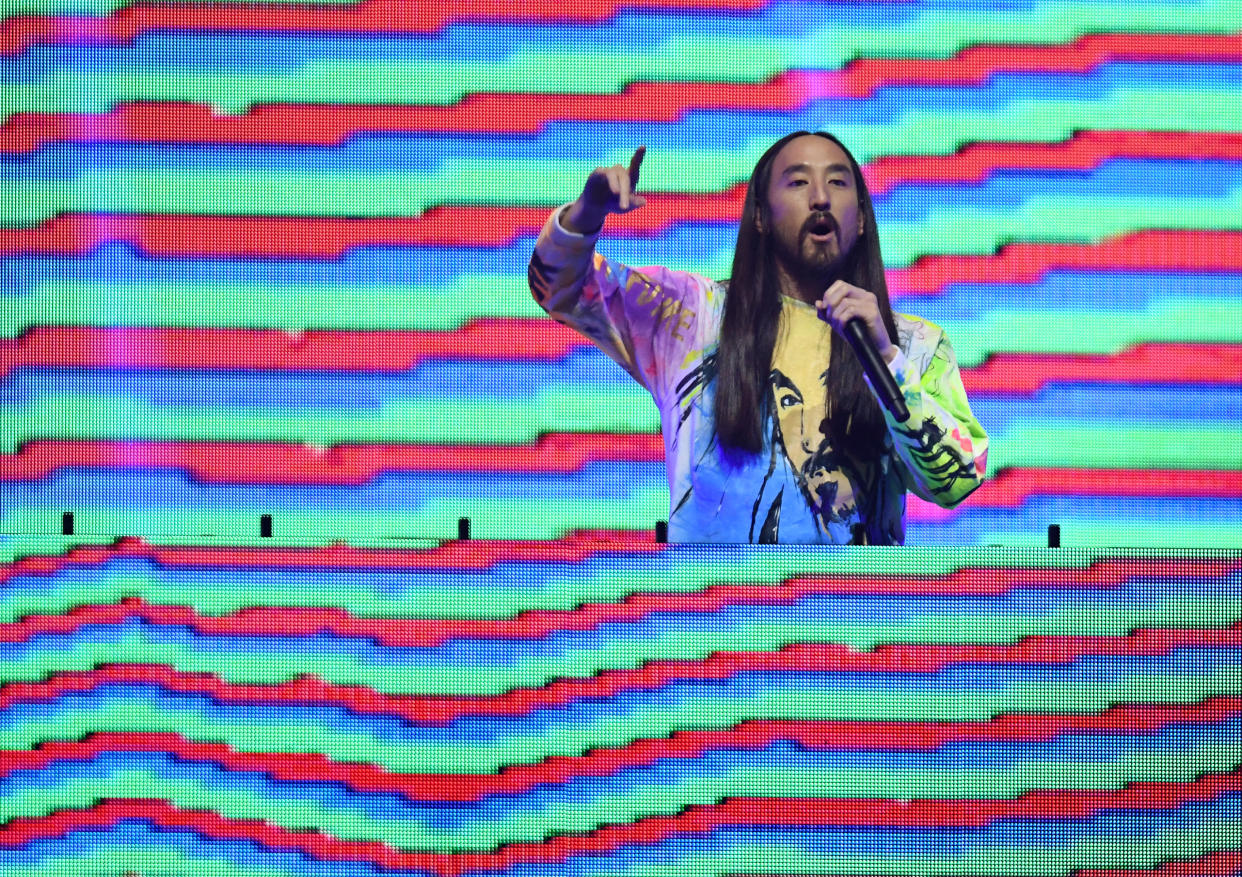Steve Aoki on NFTs: ‘Instagram is 2021, crypto wallets are the future’

Subscribe to The Ledger for expert weekly analysis on fintech’s big stories, delivered free to your inbox.
Steve Aoki is an unabashed futurist—and in his forecast for the years ahead, cryptocurrency technology only gains prominence.
At the core of the electro-dance beatmaker’s belief is a conviction that blockchains, the tech behind virtual assets like Bitcoin, will become central to how people express themselves online. “That's the great thing about crypto, the whole thing, it’s all transparent,” Aoki tells Balancing The Ledger, Fortune's show covering the intersection of finance and technology. “You can flex—or you show—how you support who you support. It's all in your wallet,” effectively, in this case, a digital gallery that can publicly display which artworks and artists a person has patronized, he says.
In Aoki’s vision of the future, the behemoth social media giants that dominate so much of people’s time and attention today, like [hotlink]Facebook[/hotlink], lose musculature. “How we identify ourselves to the world, it's gonna be, not just your Instagram profile—that's what it is now, that's 2021—but in the future it will be your wallet” for storing virtual goods, he says.
Aoki envisions people loading up their digital wallets with non-fungible tokens, or NFTs, blockchain-based collectibles that people might buy to show off their personal taste. NFTs—which are basically digital certificates of authenticity associated with everything from virtual land to digital art to electronic versions of basketball cards—recently ignited a frenzy that drew in everyone from Paris Hilton to [hotlink]Twitter[/hotlink] founder Jack Dorsey.
Generally, anyone can enjoy the digital content associated with an NFT—viewing an artwork, listening to a song—without having to buy the NFT itself. But people are spending money on NFTs anyway, frequently as a sort of speculative alternative investment. Sometimes people buy them as a form of artist patronage or, in yet other cases, they do so as a hobby, like stamp collecting.
A hairy predicament
Whatever a fan's motivation, Aoki is one of many musicians lately latching onto the new revenue opportunity. Other artists capitalizing on the trend include the Kings of Leon, Grimes, and Deadmau5. Even the CEO of [hotlink]Coinbase[/hotlink], Brian Armstrong, recently released an NFT-song in collaboration with David Khanjian, a DJ who goes by the stage name Davi.
Aoki, also a scion of the Benihana restaurant dynasty, sold his first NFTs earlier this year. One piece, called “Hairy,” entailed a short video displaying a blue-furred monster-man jamming out to a synth-driven, electro-industrial track of Aoki’s creation.
https://twitter.com/niftygateway/status/1368627546825359367?s=20
That sale is one of the top grossing of any NFTs to date. At press time, the piece ranked fourteenth overall, having sold for $888,888.88, putting it just ahead of an a recent New York Times’s op-ed that sold for $844,018.
The buyer of Aoki's fleecy fantasy? John Legere, the former CEO of T-Mobile. “He's an old friend of mine and he's been very supportive of me,” Aoki says of the ex-telecom exec. “He also believes in the future of NFT's and he's collecting art by artists he loves.”
Not just ultra-high-end art
Aoki is doubling down on his early success, despite signs that the market for NFTs has cooled a bit compared to recent highs. On April 27, Aoki is releasing a new set of NFTs inspired by Neon Future, a comic book franchise he developed with Tom Bilyeu, CEO of Impact Theory, a digital content studio.
https://twitter.com/maciej_kuciara/status/1385348686276743168?s=20
“We don't want to be just doing ultra-high-end art,” Bilyeu says of his studio’s NFT-slinging aspirations. “There's a lot of PR to be gotten from it and a lot of amazing art to create there, but our primary focus is going to be lower cost items, higher volume.”
The team aims to attract buyers who are “not just wanting to be flippers, but actually wanting to buy something that [they] love and think is amazing and want to hold on to,” says Bilyeu, who formerly cofounded Quest Nutrition, a protein bar-maker that sold in 2019 to Simply Good Foods, owner of the Atkins diet business, for $1 billion.
"Follow the culture"
As an artist, Aoki says he strives to stir emotions in his audience, whether through music or through NFTs.
“It's all about feeling,” Aoki says. “It should make you feel what we feel, where we're getting chills, where we're like, 'Wow, this is a moment.'”
That same principle guides Aoki’s approach to his finances too. “I'm very high risk in certain cases, because I follow my heart,” he says, noting that he often clashes with his more conservative-minded wealth managers.
“I jumped into [hotlink]GameStop[/hotlink] one week before that thing blew up, I couldn't believe it,” Aoki says, referring to a well-timed investment he made in the video game retailer's stock before a day trader-driven mania caused the share price to reach incredible heights. “I also put [money] into Dogecoin"—a joke cryptocurrency and frequent subject of speculation—"before that went up, and I pulled out. I made a little money. It wasn't a lot, but I've been very lucky with a lot of investments, being very early.”
When people ask how Aoki picks winners, he replies: “My ears are open." He adds, simply, "I follow the culture.”
More must-read finance coverage from Fortune:
"Seductive charm": There’s a surprising thread linking Ponzi, Madoff, and today’s brazen crypto scammers
How a cultural anthropologist embraces finance
How much Bitcoin comes from dirty coal? A flooded mine in China just spotlighted the issue
The price of lumber is up over 200%—and pre-COVID levels might never return
Venmo app adds cryptocurrency trading for the millennial set
This story was originally featured on Fortune.com
